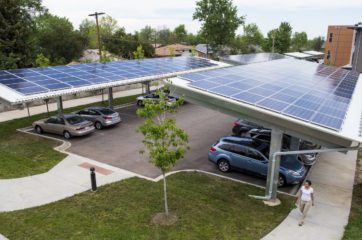Interview conducted by Anjali Gutali
The COVID-19 pandemic curtailment on travel and economic activity has resulted in a notable drop in global fossil fuel demand, and a corresponding drop in greenhouse gas (GHG) emissions. In addition, the lowered demand for fossil fuels combined with the Saudi-Russia oil price war has had the outcome of deeply reducing the price of oil. But a repercussion of the economic slow-down in the U.S. has been an economic downturn with an impactful loss of jobs causing unemployment numbers to surge to levels not experienced since the Great Depression. What are the implications for the energy sector [1], the environment, and clean energy advancements in the face of the complex scenario of lower fossil fuel prices, high unemployment and temporary reductions of GHG emissions?
According to two political economics professors at Morgan State University, Associate Professor, Interim Chair & Graduate Coordinator Dr. Linda Loubert and Director, Patuxent Environmental & Aquatic Research Laboratory (PEARL) Dr. Scott Knoche, GHG emissions are an outgrowth of consumer behavior driven by price signals and a prevailing mindset geared toward fossil fuels that has been instilled by established market forces and public policy. Even though clean energy technology has been building steam and gained a foothold in the energy marketplace over the past decade, it still has a long road ahead in gaining equal footing with an established and market-dominant fossil fuel industry. The “current low oil prices coupled with sky high unemployment rates compound and complicate the climate change problem,” says Dr. Loubert, because people’s consumption decisions are based on affordability.
To illustrate the scale of the climate challenge and the timeframe needed to make impactful change consider the following: the pandemic-induced decline in GHG emissions is not sustainable after the economy is fully functioning. Taken as a whole, emissions worldwide have only been reduced by 1%, and these emissions reductions don’t make a dent in overall concentrations of atmospheric GHGs. According to leading atmospheric scientists, these concentrations need to be drastically reduced by 2030, lest we suffer devastating weather consequences that will have enormous detrimental effects on the economy, much like this pandemic.
The market reality is that clean renewable forms of energy are substitutes to traditional sources of energy. Therefore, “historic low oil prices do not bode well for clean energy production,” says Dr. Knoche. Strict market economics dictates that “low oil prices will negatively affect investments in clean energy because consumers are price conscious and will be more inclined to purchase energy from cheaper fossil fuel-based sources.” If oil prices remain low for a long time, it will substantially reduce investment in new clean energy products, because there would be no return on investment on successful clean energy innovation. “Ultimately, it is critical that clean energy becomes cost competitive with fossil fuels.”
Dr. Loubert believes that society’s sense of impacts from fossil fuel consumption is shaped by public policy, and its toleration for the status quo. “The Trump administration began with the mindset that the fossil fuel industry needs to be robust in order to protect jobs.” It favors fossil fuel and it is hard to reshape the consumer mindset as federal agencies continue to roll back environmental regulations and relax regulatory air and water requirements. This disadvantages clean energy markets and could undermine robust and rapid deployment of technologies post-pandemic. “COVID-19 has been a market interrupter, and is forcing us to rethink how we operate,” she said. The main objective of business is to make money. But Dr. Loubert ponders whether that means a “rational economic actor will only think of the bottom line, or if a rational economic actor will figure environmental consequences as an essential element in their business plan?”
Behaviors will play a big role in whether climate change can be effectively confronted. So, how can behavior be shaped to make the most impact in a quick turnaround timeframe. If the average consumer considers cost over the impact their choice has on the environment, then the best way to stimulate an expanded robust clean energy market that offers the same job and economic security as the fossil fuel industry, is through government action and conscious capitalism.
This requires government policy support for clean energy technology and businesses to make the bold choice to invest in clean energy and divest from fossil fuel interests. Dr. Knoche absolutely believes that carbon pricing can stimulate quicker emissions reductions. He stated, “I would strongly support carbon pricing and clean energy research subsidies to incentivize innovations needed to make clean energy cost competitive, otherwise it will never have a fundamental breakthrough.” If this can be achieved, then “we are going to be living in a much cleaner, more environmentally sustainable world.”
Proponents of carbon pollution pricing say it is a win-win proposition, one that can be environmentally and economically just. It delivers disproportionately affected (minority and underserved) communities from climate and economic harm. A portion of the pollution fees assessed on producers of fossil fuels could flow back to low income consumers to bridge the initial higher cost gap in transitioning to clean fuels. Other monies could be diverted to developing resilient infrastructure and other environmental or social programs, like the Kirwan Initiative in Maryland. The beauty of this is that the monies come from fossil fuel producers and not from taxpayers.
As economies struggle to cope with the COVID-19 pandemic, the longer term but equally threatening climate crisis cannot be ignored, even temporarily. Private sector business plans and government policies should be consistent with an accelerated transition to zero emissions. Companies, universities and even the Vatican have begun moving to divest their fossil fuel interests and energy companies have expanded their renewable energy portfolio. Radically more needs to be done more rapidly. Ceding ground to cheap hydrocarbons and fossil fuels, and relying on markets and voluntary action cannot be an option. Government action is required. Maryland can choose carbon pricing policy, a true market corrector, to lead in our recovery.
[1] Maryland led the country with the highest per capita income prior to COVID-19, and now ranks 13 among the 50 states with the highest rate of joblessness. It has been processing 300,000 new unemployment applications since March 2020.









